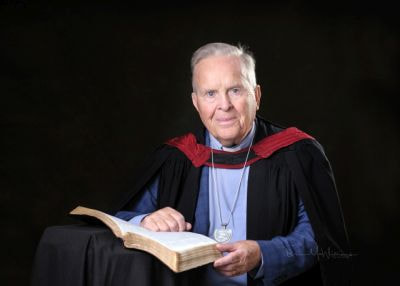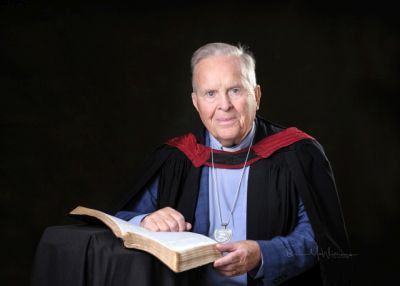Today I would like to reflect briefly on the doctrine of the trinity in light of the fact that historically, going back to the late 1800's, this Church was known by many as the Dromore Unitarian Church. And so I am aware that this congregation would include members, many of whom might still consider themselves unitarian today, and some of whom would consider themselves trinitarian.
A few weeks ago, Ernie Martin lent me a file with news-paper clippings and pamphlets regarding the life of Rev. Peaston that were left behind in the manse after Rev. Peaston died. It is clear from those clippings that theologically speaking Rev. Peaston would have regarded himself as unitarian, although it was clearly not a theological position that he ever sought to impose on others. Clearly for Rev. Peaston, he, together with the constitution of our denomination operated on a deeper principle of non-subscription.
The central idea of Non-Subscription in our constitution is that nobody in the NSPCI is forced to subscribe to any human test and confession of faith. Rather, with the Scriptures of the Old and New Testament as the central Rule of Christian faith, under the teaching of our Lord Jesus Christ, it is “...the inalienable right of every Christian to search these records of Divine Truth for our own instruction and guidance, and to form our own opinions with regard to what they teach.” And so a central principle of the NSPCI has been the principle of the right to private judgement and free inquiry.
This is quite unique in the world of Christian Churches. Most Christian Churches today require (at least officially) that their members and ministers subscribe to the Apostles and Nicene creeds. In the NSPCI, if a member wishes privately to subscribe to the Apostles and Nicene Creed they are free to do so. Just as others are free not to subscribe to these creedal statements. Thus there is room in our Church for those who might consider themselves trinitarians and unitarians. My understanding is that the name of the Church was changed to the Dromore Non-Subscribing Presbyterian Church because it is a more inclusive term and embraces people of differing theological positions.
Having set that as the back-drop, on this Trinity Sunday, I would like to share some brief reflections on trinitarianism and unitarianism.
The term Trinity doesn't appear in the Bible itself. Trinitarians who use the term however believe that the doctrine can be inferred from Scripture even if it is not explicitly stated in Scripture.
The term Trinity was first used by Theophilus of Antioch in 170 AD. In other words, for the first 140-150 years, the term was unknown to Christianity. The full Doctrine of the Trinity only came to be fully expressed and widely accepted in 381 AD at the Council of Constantinople.
Orthodox trintarian theology believes that God is made up of three separate but equal persons, Father, Son, and Holy Spirit. From this perspective God is One but Three. It could also be said that God is three, but One.
God is One substance with three equal persons. The Father is not the Son or the Holy Spirit, but all of them are 100% God. From this perspective, Jesus is understood to be 100% God and 100% human. Trinitarians would say that God became a human-being in Jesus.
On the other hand….
Unitarian Theology emphasizes the Oneness of God. Unitarians are happy to use the terms Father, Son and Holy Spirit, but they would differ in how they are used. For Unitarians, Father, is a description of God as the loving source of all that is. The word Spirit is also regarded as a descriptive word for what God. Thus they are regarded as two ways of describing the One reality of God.
Christian Unitarians generally emphasize the humanity of Jesus whose life was filled in a special way with God's Spirit. Some would say that according to Paul in Romans 1:4 Jesus was appointed or regarded as God's son because of his spirit of holiness. In other words, his life was a life lived in complete openess to God and therefore he was referred to as God's Son. Other's would say that Jesus was God's first creation in accordance with Col 1:15. Other's might say that in Jesus God's Divine Image was fully realised or restored in humanity and that that all human beings were made to reflect the Divine Image and therefore to be son's and daughters of God.
Unitarians might even speak of Jesus sharing God's divinity, but they wouldn't say that Jesus is God-Almighty because there are many passages of scripture where Jesus is regarded as subordinate to the Father.
Now, both unitarian and trinitarian Theologians will find passages of scripture to argue their positions.
I believe there is great wisdom and generosity of spirit in the position of the NSPCI that gives space for individual members and individual ministers to come to their own conclusions on these matters.
What I find most interesting though is that these doctrinal matters are not the focus of Jesus' teachings. One would think that if they were vitally important to matters of our salvation, then Jesus would have spelled it out in very clear detail.
What was of far more importance to Jesus was his teaching on love. When Jesus was asked what the most important commandment of all was, he summed up the whole of the Hebrew Scriptures with two commandments and one central word: the word Love.
“Love the Lord your God with all your heart and with all your soul and with all your mind and with all your strength.’The second is this: ‘Love your neighbor as yourself.’. There is no commandment greater than these.”
As the Apostle Paul would later write in Romans: Love is the fulfilling of the law.
8 Let no debt remain outstanding, except the continuing debt to love one another, for whoever loves others has fulfilled the law. 9 The commandments, “You shall not commit adultery,” “You shall not murder,” “You shall not steal,” “You shall not covet,”[a] and whatever other command there may be, are summed up in this one command: “Love your neighbor as yourself.”[b] 10 Love does no harm to a neighbor. Therefore love is the fulfillment of the law.
And in 1 Cor 13: I can have all knowledge (in other words, I can have a doctorate in theology and understand the intricacies of trintarian and unitarian theologies), and I can have faith that can move mountains, but if I do not have love, I am nothing.


 RSS Feed
RSS Feed